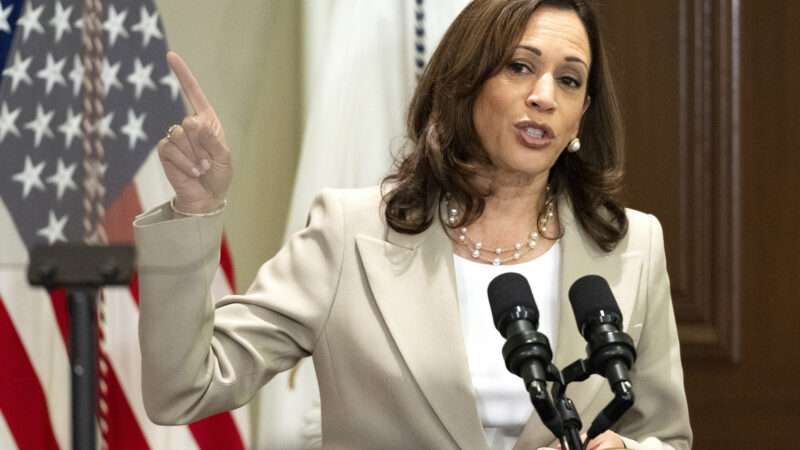
The White House created a new task force on Thursday to combat online harassment, abuse, and sexual violence. The initiative was unveiled by Vice President Kamala Harris, who gave little indication that she understands the difference between preventing violence and deterring harassment, the latter of which is outside the government's purview.
"For far too many people, the internet is a place of fear," said Harris. "This affects all of us if it affects any one of us."
Online harassment is indeed a frustrating and pervasive problem; contrary to the White House's framing that harassers primarily target women and minorities, people of all backgrounds contend with it if they spend any significant time online. A Pew survey from 2017 found that 44 percent of men said they had experienced online harassment, compared with 37 percent of women.
"It's true that women who have been targets of online abuse were more than twice as likely as men to describe their last such experience as extremely or very upsetting (35 percent vs. 16 percent)," wrote Cathy Young for Reason back in 2017. "But, interestingly, there was no gender gap in actual negative effects of online harassment, be it mental stress, problems with friends and family, romantic problems, reputational damage, or trouble at work."
In her remarks, however, Harris focused on the harm to specific groups.
"One in three women under the age of 35 report being sexually harassed online," she said. "Over half of the LGBTQ+ people in our country are survivors of severe harassment. Nearly one in four Asian Americans report being called an offensive name, usually motivated by racism. No one should have to endure abuse just because they are trying to participate in society."
It would certainly be better if the internet—and social media, in particular—was a friendlier virtual place. But the federal government has no mandate to criminalize harassment, which constitutes protected speech under the First Amendment. While it has become trendy to refer to any sustained wave of negative online feedback as harassment, sometimes criticism is partly or wholly deserved, as was the case with Department of Homeland Security disinformation czar Nina Jankowicz, whose ouster was sympathetically covered by The Washington Post and framed as the result of such harassment.
In any case, it falls to social media companies to craft rules that deal with and define harassment. These rules often fail to strike a good balance between allowing open discussion of controversial topics and deterring nastiness, but there's little reason to think a missive from the White House will improve matters. On the contrary, the federal government's previous attempts to wrangle social media platforms have prompted the companies to adopt laughably bad policies. By asking Facebook and other sites to prohibit misinformation and disinformation, the Biden administration has indirectly worked to outlaw legitimate dissenting opinions relating to COVID-19. For months, any open acknowledgment of the lab leak theory was forbidden on Facebook.
The White House fact sheet announcing the online harassment task force makes two references to disinformation, suggests that it falls under the broad category of online abuse, and explicitly posits that the government should come up with strategies to combat it. The press release is careful to note that these strategies will take the form of "recommendations" rather than commands, but given that social media companies are constantly under siege by regulation-happy members of Congress in both parties, they face tremendous pressure to comply with whatever the Biden administration proposes. Several Twitter users have already sued the Department of Health and Human Services, arguing that previous guidance from Secretary Xavier Becerra and Surgeon General Vivek Murthy caused the site to take down their accounts.
"By instrumentalizing tech companies, including Twitter—through pressure, coercion, and threats—to censor viewpoints that the federal executive has deemed 'misinformation,' the Surgeon General has turned Twitter's censorship into state action," writes the New Civil Liberties Alliance (NCLA), a legal advocacy group that is representing the banned users.
Like the disinformation board that preceded it, the White House's new task force seems incredibly misguided. At the very least, its mission should be narrowed to focus on speech that does in some cases fall outside of First Amendment protection: actual threats of violence, revenge porn (which is illegal in some states), and the like.
The post Kamala Harris' Online Harassment Task Force Is a Bad Idea appeared first on Reason.com.







